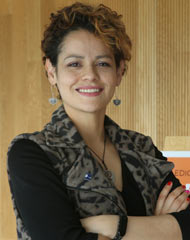2020_02_04_TAN_bohorquez
Diana Bohórquez (psychologist): "1 in 59 people have an autism spectrum disorder and 80% of adults are unemployed".
The director of Specialisterne opened the cycle of the University of Navarra "Training to understand disability", in which 500 people participate.

PHOTO: Manuel Castells
"1 in 59 people have an autism spectrum disorder and 80% of adults with these diagnoses are unemployed". This was pointed out at the University of Navarra by Diana Bohórquez, psychologist and director of the electronic consultancy Specialisterne, during the opening of the cycle Training to understand disability.
Specialisterne promotes the training and employment rate of people on the autism spectrum (ASD) and with Asperger's syndrome, focusing on their special skills. Bohórquez explained that, despite the training of many of these people, their communication difficulties and lack of social skills hindered their job integration, especially due to difficulties in passing work interviews. "However, with support and specific training , the number of people with autism who find employment rises to 87%," he said.
According to the psychologist, the most outstanding abilities of these people are: passion for details, perseverance, logical reasoning, high concentration, good report, visual skills, pattern recognition and honesty. "However, each case is unique and the success of the process is to be able to individualize the skills to find the most appropriate employment for each one," she explained.
The skills that characterize Specialisterne's job listings allow its employees, for example, to spend 18 months watching eggs, test 9 games in 8 weeks or classify 1,000 web pages per hour. "The strengths are transformed into employment benefits - according to Bohórquez - and this generates a value chain with social impact, thanks to the support it gives to diversity and talent, both for the person, their family, the environment of work and the social environment".
In conclusion, Bohorquez recalled that these disorders are not recognizable to the naked eye, so society does not anticipate that they are different. Their inclusion and acceptance depends on what others want to see. For this reason, the director of Specialisterne ended by encouraging the audience by saying: "It is up to the professionals of the future to decide what they want to see".
Astronomy, dance or basketball: three stories of overcoming challenges and talentThe cycle "Training to understand disability" brings together experts annually to train and communicate about inclusion, according to Tomás Gómez-Acebo, Vice President of Alumni, at the inauguration. The sessions will continue on the 10th with the intervention of Enrique Pérez Montero, from high school Astrophysics of Andalusia, an astronomer who suffers from retinosis and will explain how it is possible to learn astronomy without seeing.
On the 17th, Becky Siegel, choreographer, dance teacher and director of the company Kon Moción, formed with people with chronic diseases, disabilities, etc., will participate. Finally, Óscar Rived, coach of the Navarre team Psicobasket Ardoi, will close the cycle talking about this project created in 2011 with the goal deque people with disabilities to practice a therapeutic sport.

